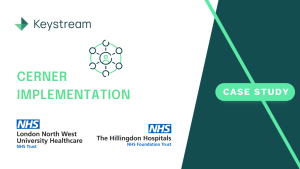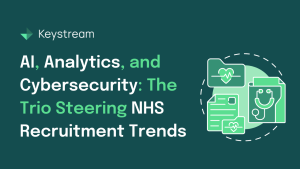27.03.2024
Sustainable Transformation: Maximising the Impact of NHS Digital Investment
As the NHS prepares to embark on a new era of digital transformation, the recent announcement of a £3.4 billion investment in AI, digital, and other tech-related initiatives marks a significant milestone. With the aim of boosting NHS productivity and achieving a 2% annual productivity increase by 2028/29, the potential benefits of this investment are clear. However, while technology undoubtedly plays a crucial role in modern healthcare, it is essential to recognise that digital solutions alone may not be sufficient to achieve the desired outcomes.
At Keystream, we believe that sustainable transformation requires more than just the implementation of new technologies. While external parties can bring valuable expertise and resources to the table, the true measure of success lies in the ability to upskill and empower NHS staff to drive lasting change from within. By fostering a culture of continuous learning and development, we can ensure that the benefits of digital transformation are not only realised but sustained over the long term.
Statistics indicate that significant productivity gains can be achieved by optimising core processes within hospitals and across integrated care systems. According to a study by the Health Foundation, improving operational efficiency in healthcare settings could lead to savings of up to £12.5 billion annually by 2026/27. By streamlining workflows, reducing administrative burden, and eliminating unnecessary duplication of effort, healthcare providers can unlock substantial cost savings while enhancing the quality of care delivered to patients.
Moreover, the success of digital initiatives depends on the willingness of frontline healthcare professionals to adopt and utilise these tools effectively. Research has shown that workforce engagement and buy-in are critical factors in the successful implementation of digital solutions. A survey conducted by the King’s Fund found that only 37% of NHS staff felt involved in decisions about technology implementation, highlighting the importance of fostering a culture of collaboration and empowerment within healthcare organisations.
To ensure the seamless integration of digital tools into clinical and operational workflows, it is essential to design solutions that align with the needs and preferences of frontline staff. Rather than imposing technology for technology’s sake, digital solutions should be viewed as enablers that empower healthcare professionals to make better decisions more efficiently. By providing frontline staff with access to real-time data, evidence-based guidelines, and decision support tools, we can empower them to deliver more personalised and effective care to patients.
Furthermore, by ensuring interoperability and integration across the healthcare ecosystem, we can create a truly connected and patient-centred care experience. By linking patient data seamlessly across different care settings, from primary care to hospital admissions and community services, we can ensure that healthcare professionals have access to comprehensive and up-to-date information when making clinical decisions. This not only improves patient safety and outcomes but also enhances the overall efficiency of healthcare delivery.
In conclusion, while the £3.4 billion investment in AI, digital, and tech-related initiatives represents a significant opportunity for the NHS, it is crucial to take a comprehensive approach that addresses underlying processes, engages frontline staff, and prioritises interoperability and integration. By leveraging technology as a tool to optimise workflows, empower healthcare professionals, and enhance patient care, we can unlock the full potential of this budgetary investment and usher in a new era of productivity and efficiency within the NHS.
But let’s not forget the importance of sustainable transformation. While external parties can bring in expertise and resources, it’s critical that we focus on upskilling NHS staff throughout the process. By empowering them with the knowledge and skills they need to embrace digital tools and drive change from within, we can ensure that the benefits of digital transformation are not only realised but sustained over the long term.









